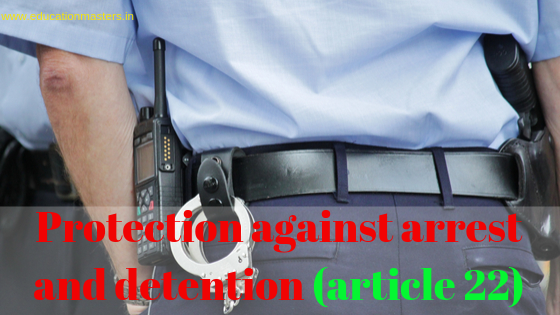Protection against arrest and detention (article 22)
By Aditya pandey | General knowledge | Oct 17, 2019

In this article, we are explaining the Protection against arrest and detention of the Indian constitution. This topic comes in all types of law exams if you are preparing for any type of law exams you should study these facts about the Indian Constitution. constitution of India is the longest constitution of the world. To gain knowledge about the fundamental rights of the Indian Constitution you can refer this article to know more.
Protection against arrest and detention (article 22) :-
Meaning of preventive detention:-
Preventive detention means arrest and detention of a person so as to prevent him from committing an apprehended crime without prosecution. Though repugnant to the idea of a free democracy it is retained in constitutional laws being necessary for the interest of and for the security and integrity of the state.
Care should be taken to differentiate preventive detention from punitive detention. Punitive imprisonment is punishment for acts committed unlawfully. On the other hand, preventive incarceration is action taken in advance to prevent possible crime commitments. Preventive detention is, therefore, action taken on the grounds of suspicion that the person concerned might take any wrong action.
Several provisions are provided in the constitution to discourage excessive use of preventive detention.
- A person can only be taken to preventive detention for 3 months. If the detention duration is extended beyond 3 months, the case must be referred to an advisory board of individuals eligible for appointment as high court judges. Implicitly, the detention period may be extended beyond 3 months only upon authorization by the Advisory Board.
- The prisoner has the right to know the reasons for his detention. However, if it is in the public interest to do so, the state can refuse to disclose the grounds of detention. It goes without saying that this power bestowed on the government gives the authorities room for arbitrary action.
- The prison authority shall provide the detainee with the earliest opportunity to speak against the incarceration. The aim of these protections is to mitigate abuse of preventive detention. Preventive detention, effectively a denial of freedom, finds a place on the section on fundamental rights because of these protections. Such protections are not open to aliens from the enemy.
For two reasons, a person may be placed in jail / custody. One is he's been committing a crime. One is that in the future he will be able to commit a crime. The subsequent incarceration is preventive detention, and an individual is deemed likely to commit a crime in this. Preventive surveillance is thus carried out before the crime is committed. It is so difficult to describe preventive detention itself. For example:-
- How can one say a person is going to commit a crime in the future?
- What are the implications of arresting a person without committing a crime?
- Why Peacetime Preventive Detention. Is it not against the protections offered by Article 22 of our own citizens?
The rules on preventive detention are repugnant to the principles of modern democracy. In any of the democratic countries, they are not included.In Britain, only during the war period was the law on preventive detention resorted to.
Here is a review of these provisions:-
- each pre-trial detention case must be approved by statute and not by the executive's will.
- Can not expand preventive detention beyond a span of 3 months.
- Any pre-trial detention case must be put before an Advisory Board consisting of High Court Judges (or individuals eligible for high court judges)
- The case must be submitted within 3 months to the Advisory Board.
- The "advisory board supports" must be continuing detention after 3 months.
- The person will be given the opportunity to make a protest against preventive detention as soon as possible.
- By statute, Parliament can also define the total detention time under the same rule.
सरकारी नौकरियों, जीके अपडेट्स और करेंट अफेयर्स की ताज़ा जानकारी सबसे पहले पाने के लिए:
-
हमारे WhatsApp चैनल को फॉलो करें:
https://whatsapp.com/channel/0029Vb6sjZz0wajwDXcd5B0U -
हमारे Telegram चैनल को फॉलो करें:
https://t.me/educationmastersin -
हमारे Facebook Page को फॉलो करें:
https://www.facebook.com/educationmastersindia





.png)
.jpg)
.jpg)


